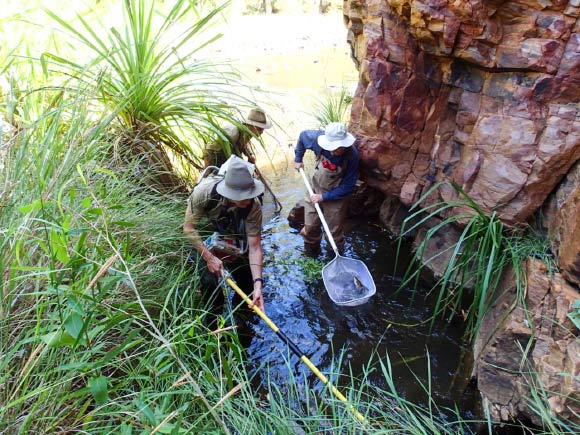A team of scientists led by University of Melbourne researcher Dr Matthew Le Feuvre has described twenty new species of freshwater fish from the rivers of the Kimberley region, Western Australia.
The new species fall within three groups: 16 species of Terapontidae (grunters); 3 species of Eleotridae (gudgeons); and one species of Atherinidae (hardy heads).
The species were discovered during nine months of fieldwork across 17 Kimberley rivers between 2012 and 2014.
Twelve of them were discovered within a three-week period in 2013 by Dr Le Feuvre and his colleague, James Shelley of the University of Melbourne, when they accessed some of the most remote rivers in Australia.
“Sampling was challenging, with Mr Shelley attacked by a freshwater crocodile while snorkeling in the Glenelg river on the Kimberley plateau,” the scientists said.
One of the new species – a 25-cm-long grunter found in the remote and spectacular Prince Regent River – is set to be named after writer and novelist Tim Winton.
“It’s in recognition of his contribution to Australia’s cultural life, his love of fish which shines through in many of his novels, and his staunch advocacy for conservation in the Kimberley,” Mr Shelley said.
Mr Winton said it was ‘surprisingly gratifying’ to have his name attached to a new species of fish.
“The Kimberley is a treasure that clearly requires more study and greater protection and groundbreaking discoveries like these underline just how much there is still to learn about this special region,” Mr Winton said.
All the remaining new species will receive a common name reflecting the aboriginal name for the area it was collected from or words describing its features, as well as a Latin scientific name.
Research describing the new species is published online in the journal Global Ecology and Biogeography.
_____
Matthew C. Le Feuvre et al. 2016. Macroecological relationships reveal conservation hotspots and extinction-prone species in Australia’s freshwater fishes. Global Ecology and Biogeography, vol. 25, no. 2, pp. 176 – 186; doi: 10.1111/geb.12397








